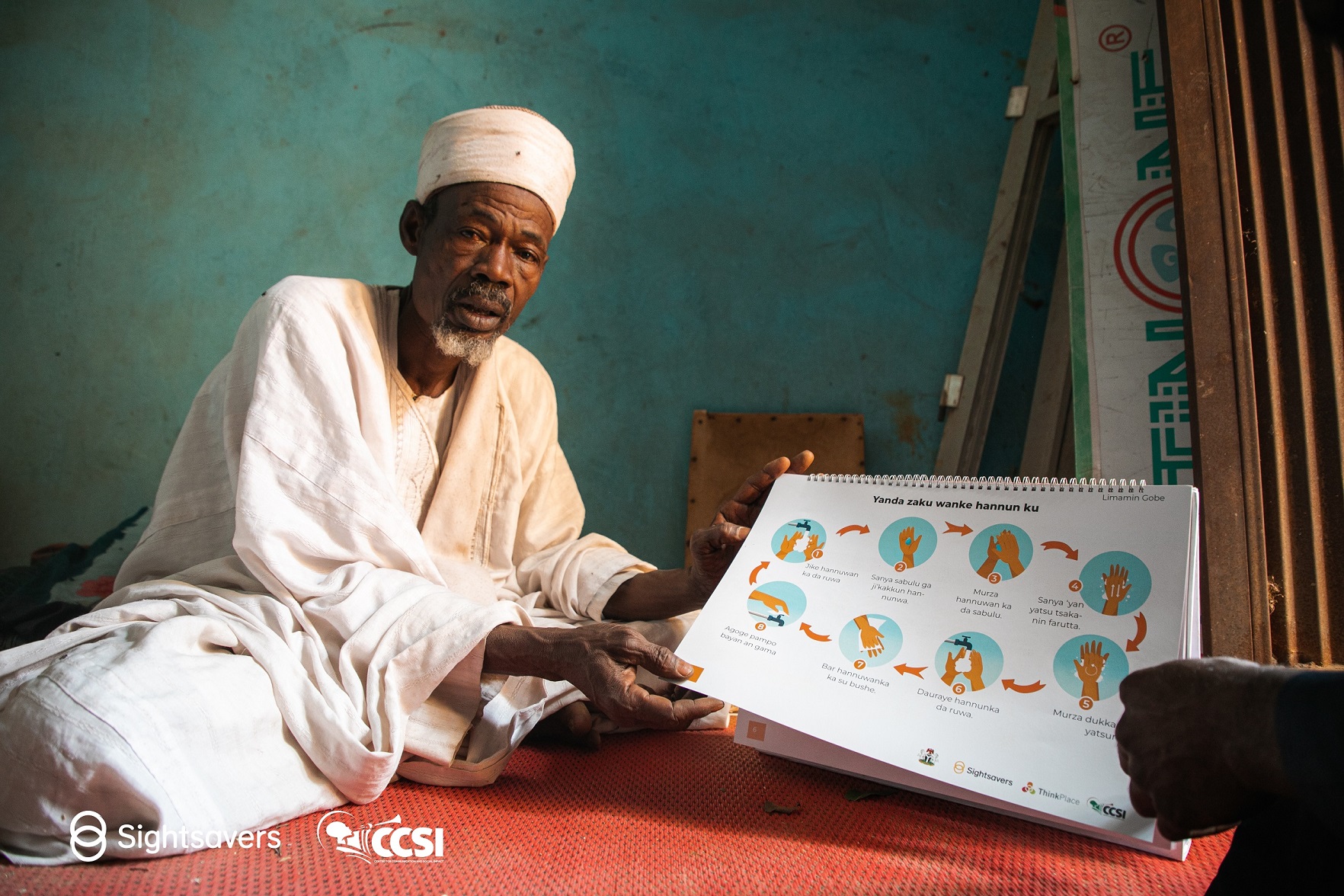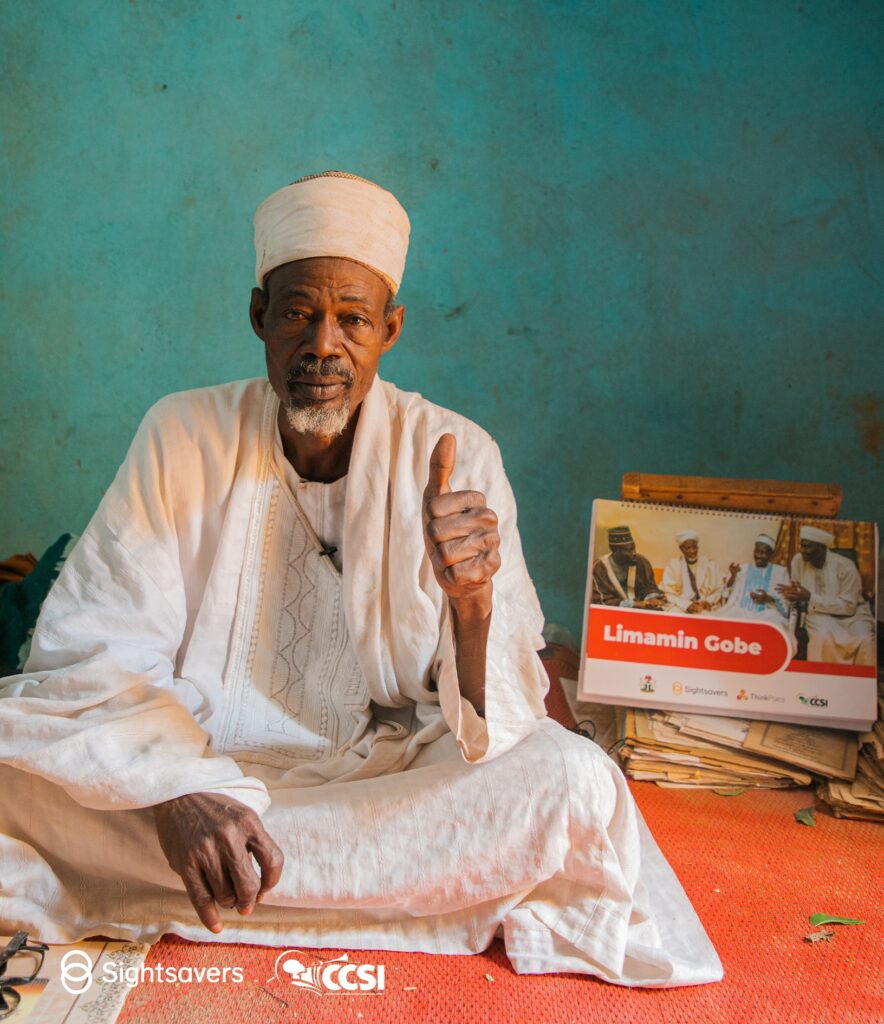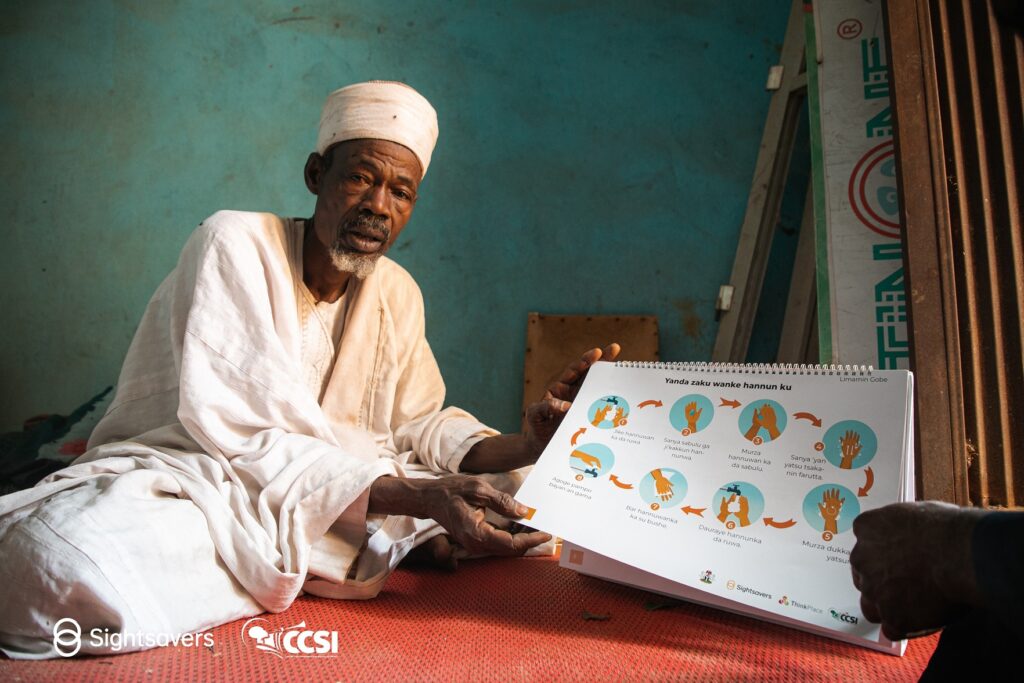There is so much that a people can do together, especially when they all commit to fighting a common cause that threatens to blur the vision of their future, just like trachoma threatens the people of Gande Community in Silame Local Government Area of Sokoto State.

Imam Faruku’s duties as the Chief Imam in Gande community, Silame Local Government Area of Sokoto state consist mainly of looking after the spiritual well-being of the people. But in recent months, Alhaji Faruku has added another dimension to his work; that of ensuring the physical health of the community.
This new addition is geared towards fighting the trachoma infection that has threatened the sight of the people of the community, rendering some blind, and severely reducing the vision of others. But unknown to the people of Gande, trachoma infections are rooted in the lack of knowledge about hygiene practices.
“We have seen the impact of poor hygiene on our people, including open defecation, and how it can get even worse if nothing is done. This is why we are happy with the project,” Imam Faruku said.
“From interactions with the project team, we have now seen the need to build toilets and we have already built four public toilets at different places. We realized that to eliminate trachoma-related blindness from our community, it is everyone’s responsibility, which is why we are working together to achieve this.”
Consequently, either in the early hours of the day during Asbar (morning prayer) or during bikin suna (Christenings), bikin aure (wedding ceremonies), or during Arabic classes at makaranta (religious school), Imam Faruku remained resolute in delivering messages about good hygiene to his people. For him, the trend toward trachoma-related blindness must be reduced.
United Community Effort
Gande’s community health effort is a joint effort between the district head, the religious leader, and the people. “We were able to build four public toilets through the contributions at ceremonies like weddings, child christenings, etc. In addition, the district head and I gave
 portions of land and some young men volunteered to build the facility for free.
portions of land and some young men volunteered to build the facility for free.
“When people started using these toilets and saw the advantages, which include privacy for their women and girls, some individuals who could afford to build in their houses started to build, and this has reduced the pressure on the public toilets.
“At the moment, I cannot ascertain the number of individuals who have built personal toilets in their homes, but there are 17 people who could not afford to build, and they came to me to ask for support. So, I raised money to build for six of them, but I am not able to support the remaining 11 yet.
“However, I encouraged them to start putting some money together so that if we could get help, it won’t require so much to complete for them. And they have started to save money already, but I don’t know how far they have come as of this moment,” the religious leader said.
Ingenious Hygiene Innovation
Now that the people have acquired the knowledge of good and proper hygiene, they could not be deterred by the expensive cost of building a modern latrine. Hence, they invented their forms of latrines with minimum cost.
Calculating the cost alongside Imam Faruku, an individual could have a latrine in his house with a minimum of ₦5,000 and a maximum of ₦170,000. Below is a table describing the different types of toilets that the ingenious people of Gande invented:
| TYPES OF TOILETS IN GANDE | COST OF BUILDING | STATUS |
| Modern Bricks Latrine | ₦160,000 – ₦170,000 | It is the safest and recommended type. |
| Soakaway | ₦50,000 | Does not give room for privacy. |
| Tyre latrine | ₦25,000 | Not usually deep enough so may get filled soon. |
| Kwangi (local plank) latrine | ₦5,000 | Very temporal because it is prone to sinking with time. |
Using imagination, their innovations include using local planks, rocky stones, and clay as alternatives to build latrines. For example, they use rocky stones or clay molding as a substitute for brick, kwangi (a local plank that is very resistant to termites) instead of expensive planks, condemned vehicle tyres, etc.
Sightsavers to the rescue
According to the World Health Organization (WHO), trachoma is a public health problem in 42 countries and is responsible for the blindness or visual impairment of about 1.9 million people. Now that figure sounds bad, but what is even worse is that blindness from trachoma is irreversible but preventable.
In the WHO June 2022 data, 125 million people live in trachoma-endemic areas and are at risk of trachoma blindness, which does not leave the people of Gande with a better fate. The infection spreads through personal contact (via hands, clothes, bedding, or hard surfaces) and by houseflies that have been in contact with the discharge from the eyes or nose of an infected person.
In areas where trachoma is endemic, active (inflammatory) trachoma is common among preschool-aged children, with prevalence rates which can be as high as 60 – 90%, conditions matched by Gande Community. The infection becomes less frequent and shorter in duration with increasing age.
Infection is usually acquired when living in a populated space with others who have active diseases, which makes the family the main setting for transmission. An individual’s immune system can clear a single episode of infection, but in endemic communities, the re-acquisition of the organism occurs frequently.
In November 2022, the Federal Ministry of Health (FMoH) identified four interventions that can be delivered to promote healthy Water, Sanitation and Hygiene (WASH) practices in support of trachoma elimination and other Neglected Tropical Diseases (NTD) control programs in Nigeria.
The Centre for Communication and Social Impact (CCSI) was engaged by the international non-profit organization Sightsavers to support the delivery of these four SBC interventions (Imams of Tomorrow, Qazami Play Tales, Clean, Beautiful & Strong: Face & Hand hygiene, and Upgrade Your Life radio series) in eighteen (18) trachoma endemic Local Government Areas (LGAs) across the four states of Jigawa, Katsina, Sokoto, and Yobe State.
Community Ownership
Sitting and reading his littafi (a religious book) on one gracious day, Imam Faruku was happy when Aliyu (not real name) walked in, and the conversation triggered joy in him. It was the evidence that his social behaviour change (SBC) campaign message was making a difference.
Aliyu (not real name) was planning his aure (wedding) with his betrothed Zainab (not real name) and had just built a house befitting for himself and his beautiful wife-to-be. Unfortunately, the land was not big enough for them to include a toilet. So, he needed a portion of land and has come to Imam Faruku for help.
“I was so happy when he told me my message influenced him and he has come to seek help to get a portion of land to build a toilet. Aliyu was about to get married and had built a house but could not build a toilet. Interestingly, my land is next to the land he built the house, so I gave him a portion,” a physically elated Imam Faruku said.
To ensure the sustainability of hygiene practices in the community, Imam Faruku recommends some sanctions by the district head against people who still practice open defecation or who are indifferent about taking good hygiene seriously in the community. According to him, the law can be enforced by a community task force called Duba Gari (Town Monitors). For him, negligence by one is risk for all.
